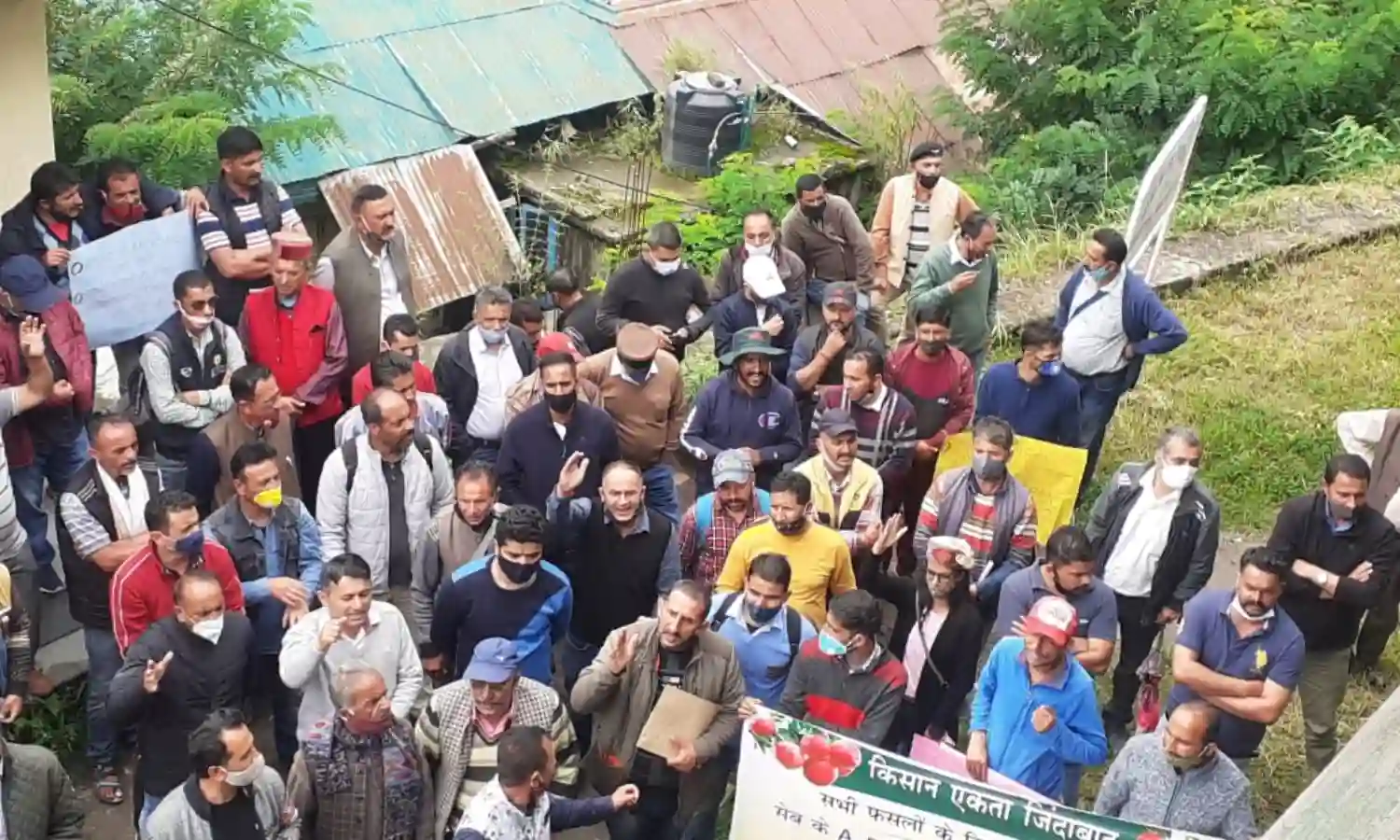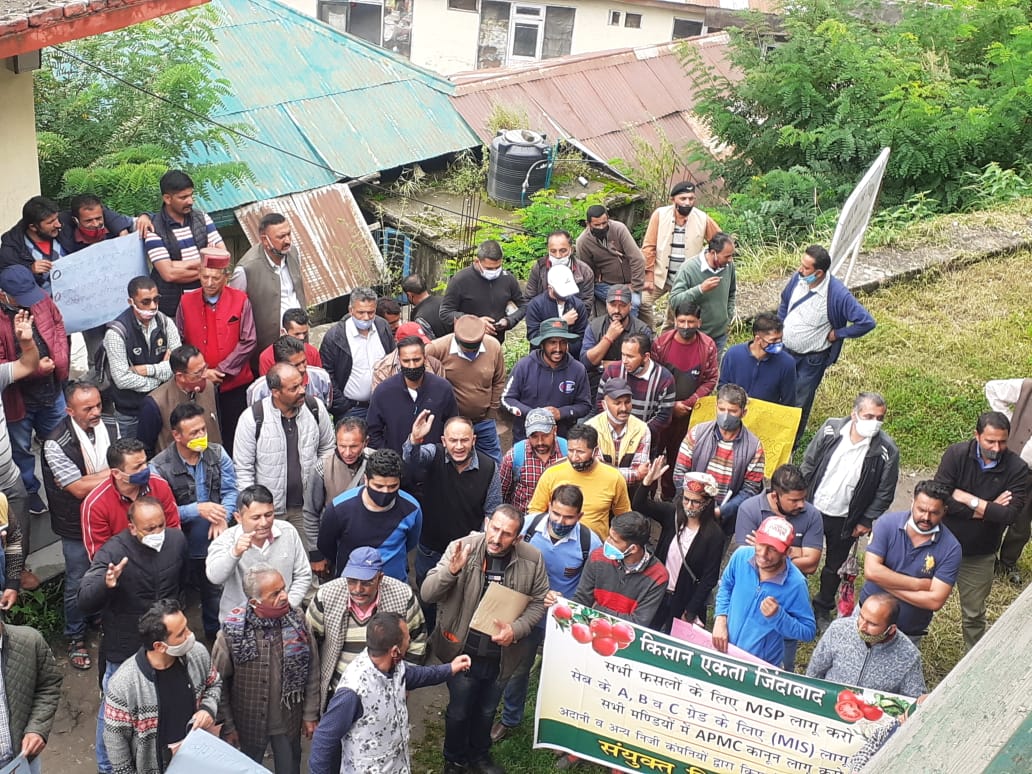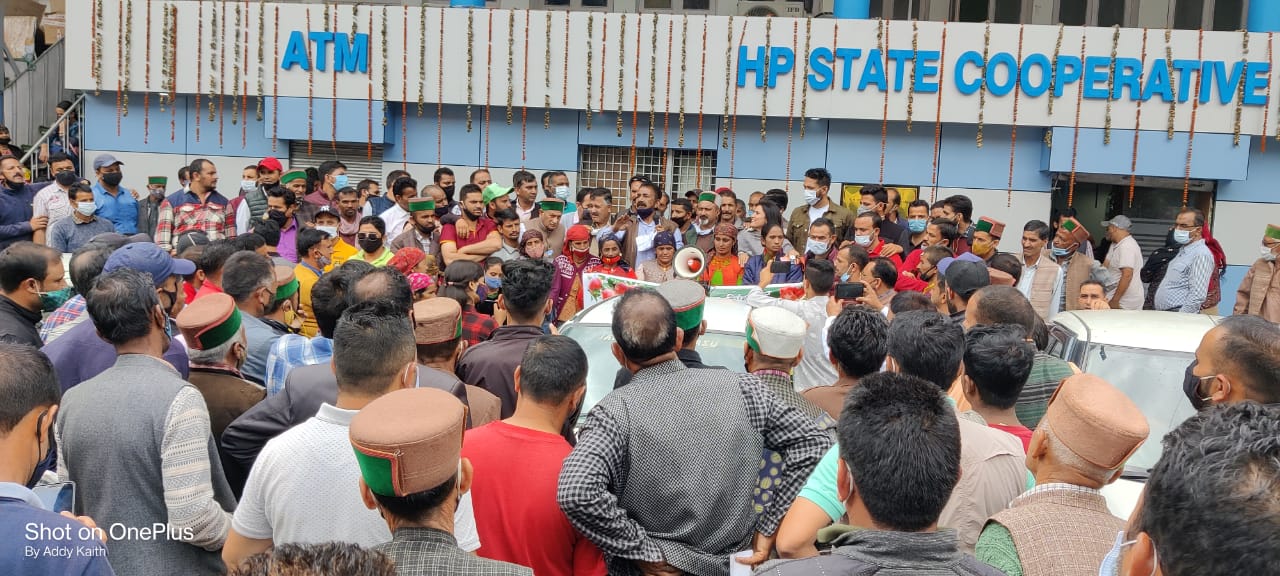Himachal Apple Producers Organise Protests Against Corporate Domination
‘These companies do not adhere to the conditions’

The apple cart in Himachal Pradesh has run into rough weather. The state often referred to as the fruit bowl of the country given its production of apple and stone fruits is nowadays echoing with protests across the apple belt, with various organisations planning further protests on September 13.
What has happened here is something that vindicates the stand of the agitating farmers across the country on the flawed model of corporatisation of agricultural produce. The agitation by apple producers being witnessed in this small hill state has a direct connection with the farmers’ movement.
With multiple factors coming into play, particularly the domination of corporate entities over apple procurement and controlled-atmosphere storage facilities, producers are not getting remunerative returns and despite increasing acreage have been left high and dry.
Horticulturists say that this is the result of the overall crisis plaguing the farm sector, and that the bubble created with the help of corporate lobby and an embedded media over the years had to burst.
Matters were compounded further by the mismanagement of Covid19 and subsequent lockdowns that hit people’s purchasing power and put fruit consumption out of their daily reach.

Himachal produces around 30% of the country’s apple crop and its apple economy is worth Rs 5,000 crores. Producers say that horticulture contributes around 7% of the state’s gross domestic product in which apple producers spread over 45 blocks have a major role to play.
Just eight blocks in the state account for nearly three-quarters of total apple production. Apple producers have often rued that despite the area under apple orchards increasing by 42% in the last five decades, productivity has not kept pace because not much emphasis is being given to research on developing new varieties.
Sanjay Chauhan of the Samyukta Kisan Manch, an umbrella organisation of many farmer outfits, described another problem:
“Another major crisis has been the constantly increasing production cost and consistent withdrawal of subsidies by the government. The prices of everything from manure, medicines and equipment have gone up. Manure costs are up nine times since 1990, medicines 20 times and equipment around seven times. Add to this the constantly spiralling petrol prices.”
Farmers are particularly peeved at the exploitation by corporates who were given huge concessions more than a decade ago for setting up controlled atmosphere stores. They say these companies started out buying apples from growers at a higher price which caused the collapse of most of the small trading units.
Thereafter the corporates started reducing procurement rates. One of the corporates also being targeted by farmers at the national level operates big controlled atmosphere stores in Himachal and is accused of slashing the procurement rate this year by Rs 16.
“Making matters worse, these companies do not adhere to the conditions of allowing the farmers to store their produce in these stores in 25% of their capacity at a price. They instead compel the producer to sell apples to them on their terms,” Chauhan explained.
Apple producers point out that although the state government has set up mandis, farmers’ access to these markets remains limited and they do not get a fair price.
They say the Agriculture Produce Market Committee (APMC) norms continue to be flouted with impunity. These include refusing to procure by weight, deciding upon prices by covering hands with a handkerchief instead of an open auction, and compelling the producer for a discount after the final price has been decided.
Then there is the continuing issue of some commission agents setting up shop along the roadside and later vanishing without paying the apple producers.
“When the APMC Act itself says that the producer be made the payment the very same day of procurement, why is this practised?” asked Chauhan.
“It is not only the case with apples but also tomatoes and stone fruits. Things will not improve till policies are made to protect the farm producer instead of the corporate lobby. The corporate entities are capable of initiating artificial glut to make the process crash, and then later make huge profits by procuring the produce at low rates,” said Sanjay Awasthi.
A Congress leader and social activist from the Arki area which is known for its tomato and stone fruit production, Awasthi told this reporter that “The focus has to be on value addition to the agriculture produce instead of just aiming for higher production. What is the point of getting big projects running into hundreds of crores when there is no long term imagination for utilising the money?”
Producers are also peeved at the lack of response and “insensitivity” of the state government to the issues being raised by them. They say that ministers on their visits to the mandis prefer to meet the arhtiyas and other “manipulators” instead of the farmers.
Their anger was on display in Theog last week when they held horticulture minister Mahender Singh and rural development minister Virender Kanwar captive for three hours, agitated over Singh’s remarks alleging the sale of apples without cartons or boxes.
The minister later said he had been misunderstood.
“He had promised to call us for talks and we are still awaiting his call,” said Chauhan.
While last year’s season was hit by the pandemic, apple producers say this year their hopes have been dashed by crashing prices.
Among other demands, the orchardists want the rates given to producers in Kashmir under the market intervention scheme (MIS) which was introduced for horticulture in the late eighties as a replica of the minimum support price (MSP) mechanism in agriculture.
They said that MIS comes into play when production increases by 10% or more or when market prices falls by 10% or more.
The SKM is presently mobilising farmers for the September 27 protests. Meetings are being held by various farmer groups across the apple belt spread in the districts of Shimla, Kinnaur, Sirmaur, Mandi, Kullu and the higher reaches of Kangra.




